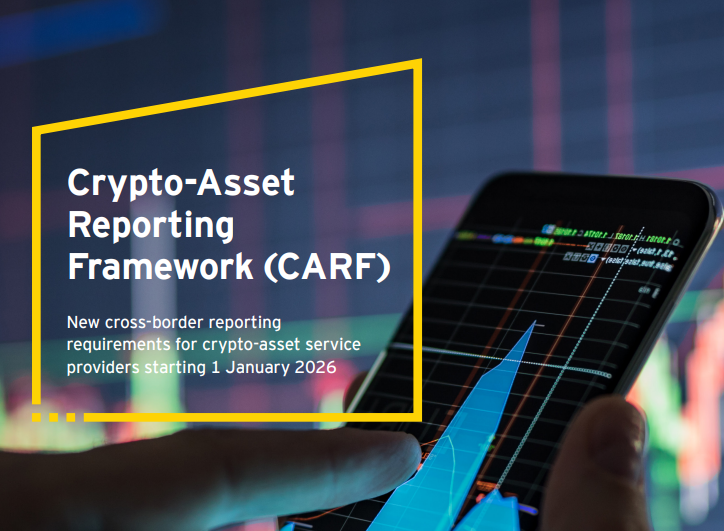New rules for crypto-asset service providers
From 1 January 2026, a new global reporting framework will introduce due diligence and reporting obligations for crypto-asset service providers. Known as the Crypto-Asset Reporting Framework (CARF), the new rules will be implemented in over 50 countries, including Ireland.

Download the CARF overview
For a detailed breakdown of the new framework and how it may apply to your business, download the EY Ireland CARF guidance here:
Download the CARF Overview
What is CARF and why is it being introduced?
The Crypto-Asset Reporting Framework (CARF) introduces due diligence and reporting obligations for individuals and entities classified as Reporting Crypto-Asset Service Providers (RCASPs). It takes effect in over 50 countries from 1 January 2026.
CARF builds on existing rules for Financial Institutions under the Common Reporting Standard (CRS). This expansion reflects the rapid development of the crypto-asset market and aims to safeguard global tax transparency progress.
It aligns with broader trends to apply financial services regulations to digital and crypto-assets.
Who is impacted?
Reporting Crypto-Asset Service Providers (RCASPs) include individuals and entities that:
- Provide services to effectuate the exchange or transfer of crypto-assets on behalf of customers
- Offer a trading platform for crypto-assets
This includes crypto exchanges, distributors, brokers, and dealers.
What assets fall within the scope?
A crypto-asset is defined as any digital representation of value that relies on a cryptographically secured distributed ledger or similar technology to validate and secure transactions.
Different rules apply to certain digital assets. For example, e-money and central bank digital currencies will fall under the Common Reporting Standard (CRS) from 1 January 2026.
What are the obligations of a Reporting Crypto-Asset Service Provider?
- Collect self-certifications confirming customer name, address, country of tax residence, tax identification number, and entity classification (if applicable)
- Monitor for changes in circumstances affecting reportable status (e.g. change of residence address)
- Submit annual reports to local tax authorities including:
- Details of the user: name, tax residence, and tax identification number
- Details of the transaction: name of each type of crypto-asset, amounts paid or received, and number of units acquired or disposed of
The first reporting deadline is in 2027 for the 2026 reporting period.
What actions are required between now and 1 January 2026?
- Determine whether you qualify as a RCASP
- Identify which products or services fall within the scope of CARF
- Design and implement procedures from 1 January 2026 to:
- Collect and review self-certifications from new and pre-existing users (and controlling persons, where applicable)
- Monitor for changes in circumstances
- Annually report relevant information starting in 2027
Ireland’s implementation status
Ireland has committed to implementing CARF as part of the global tax transparency initiative.
Although CARF has not yet been transposed into Irish legislation, businesses should be aware of the following:
- The 1 January 2026 effective date remains the target
- Irish entities should closely monitor regulatory developments
- Preparation should continue based on the international framework
How can EY teams provide support?
Understanding whether and how you are impacted may not be straightforward. EY teams can support with:
- Advising on requirements, including tracking guidance updates with EY Analyzer
- Conducting product assessments to determine in-scope and out-of-scope services
- Designing and implementing compliance procedures, including governance and staff training
- Running data analytics to evaluate completeness and quality before submission
- Managing multi-country submissions using EY’s global reporting tool, EY FIRST
For more, visit: https://blockchain.ey.com/
Common challenges to CARF implementation
EY’s experience with similar regimes (e.g. CRS) shows that RCASPs may face:
- Tracking updates across multiple jurisdictions
- Maintaining customer experience while meeting obligations, especially in digital-first environments
- Achieving reporting readiness, including:
- Data cleansing and transformation
- Registering with authorities and establishing reporting mechanisms
EY Ireland contacts
For Irish-specific guidance on CARF implementation, please contact:
- Petrina Smyth, Partner GCR – petrina.smyth@ie.ey.com
- Amanda Murphy, Partner, GCR – amanda.murphy@ie.ey.com
- Magda Eskander, Director – magda.eskander@ie.ey.com
- Shambhavi Keogh, Director – shambhavi.keogh@ie.ey.com
- Bruna Costa, Senior Manager – bruna.costa3@ie.ey.com
Contact Us
If you would like more information on how EY's team of experts can help, please reach out today.